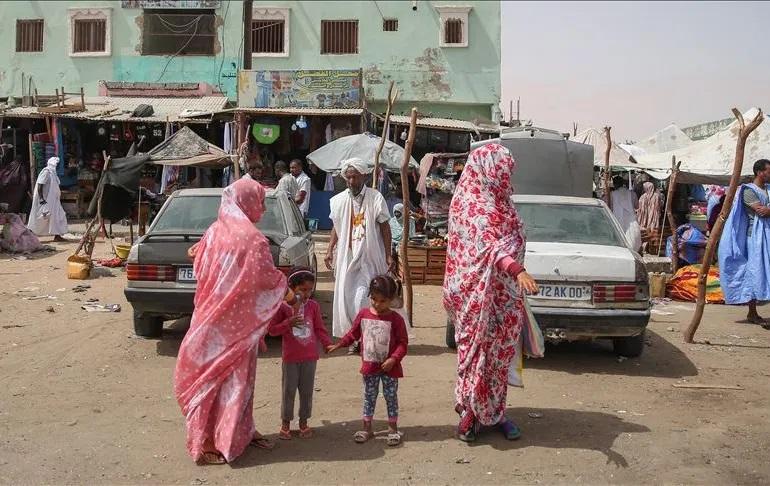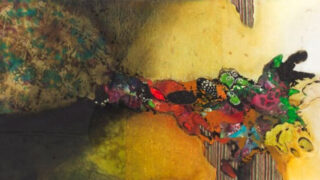
This publication has benefited from the support of the Rosa Luxemburg Foundation. This text may be reproduced in part or in full, provided the source is acknowledged.
The story of Mauritania began with the Covid-19 pandemic, when the first case of infection was announced in the country on March 13th, 2020. The case related to an Australian national who worked in a foreign mining company in Mauritania, carrying the virus in as he returned to his office from a trip abroad.
At the beginning of the pandemic, and before turning into a social reality, the government adopted precautionary measures to try and stop the virus from entering and spreading. It suspended air traffic, while anyone arriving in Mauritania by air had to quarantine in the capital, Nouakchott, for a period of two weeks, later extended to 21 days.
The government also closed down schools, introduced a curfew, suspended Friday prayers, and recommended precautionary measures in mosques during regular prayer hours. It prohibited interregional movement, shut down land border crossings, prohibited all forms of cafes, restaurants, and entertainment venues from opening, and publicised a green number to dial whenever a person was suspected of catching the virus, to be redirected towards Covid-19 designated medical centres.
Through such measures, the government tried to contain the virus, or so it said. At the beginning, the pandemic spread at a low rate, and was limited to nationals arriving from abroad. Only one person carried the virus and infected his wife.
The way tests were managed and handled was also highly criticised, where many errors were made. Some people were told that they tested negative but later turned out to be positive, and were told they needed to come back for quarantine, which was too late as they had already been in contact with other people.
The number of contaminations then was limited to seven people. Once recovered, Mauritanians breathed a sigh of relief, and considered themselves to have succeeded in overcoming the pandemic. Both people and government then took a break from the disease and were given a grace period. Was it properly used, though?
The first wave, and the beginning of social propagation
On May 12th, 2020, the ninth case emerged, which would become the first worrisome social case. The infected person couldn’t trace the source of infection, and had not arrived from abroad. Another case of a lady preceded this one, who couldn’t trace the source of her infection either. Likewise, she hadn’t arrived from abroad but didn’t cause any other infections, which wasn’t the story of the ninth case, who worked as the director of a wellknown shopping centre in Tevragh-Zeina, one of the capital’s suburbs. He died after being diagnosed with the coronavirus at a cardiac centre in Nouakchott. His case is considered the beginning of social infections and viral propagation… which became the reality in Mauritania, no longer mere tales brought in by travellers rather than gifts. The story behind the ninth case caused much debate then, as the man had gone through many private clinics undiagnosed, until it was too late, that is. The deceased’s daughter wrote about the negligence to which her father had been subjected, and which resulted in his death. This aroused much debate and angered many citizens.
What “Precautions” in a Country like Yemen?
02-08-2021
The infections then unravelled. Initially, the Ministerial Covid-19 Committee approved a policy of isolating any suspected case of infection, along with all its contact cases. It established quarantine centres, most important of which the one set up on the premises of the modern University of Nouakchott.
In one of his televised appearances (1), the Minister of Health said: “Before the first coronavirus case appeared in the first stages of Covid-19, when cases barely covered the number of one hand’s fingers – when a person was suspected of being infected, and tested positive, they were quarantined, and taken care of so that no other people would be contaminated. We aimed at having zero Covid-19 cases. However, with the propagation of the virus in the capital, we moved towards rapid, and less precise, testing. We adopted a strategy of saving accurate testing for quasi-confirmed infections, and rapid testing for suspected or contact cases”. Such testing policy was highly critiqued, as tests were scarce at the beginning, and a person would wait for days to find out the result, which worried many.
Sidi Mohammad al-Amin (2) is an education inspector that was quarantined on May 17th, 2020 in a hospital designated for Covid-19 cases. He was admitted after two days of showing mild symptoms, two days under observation, after which he was moved to the university compound residence – as the hospital designated for Covid-19 patients became full. In his testimony about the experience, he says: “The plan that the Ministry of Health devised was – apparently – to quarantine all Covid-19 patients, but their data wasn’t accurate. The infection plagued all houses and spun out of control, which is what the Ministry of Health came to note, one month later, right after I finished my quarantine at the university compound”. He confirmed: “The tests screening for Covid-19 were limited in number, and the demand was high. Only those with connections could get their tests categorised as urgent, while some family tests got lost and so they retested those families; sometimes PCR test results took a week to come out, that is, until the ministry received the rapid test kits in large quantities… If I were to evaluate the Ministry of Health during the peak of the outbreak, that is, during my own infection, I’d have given it two and a half stars out of five: it tried to contain the viral infection first, limit its spread second, and, finally, began to concentrate its efforts on the elderly and those with chronic illnesses. At the same time, its capacities and means were limited, in the face of a chaotic society whose level of sanitary awareness is quite low… Covid-19 revealed the fragility of the healthcare system”.
A Covid-19 infection turned into a case of stigmatisation. In handling the virus, alarm, stigmatisation, and distrust in the health sector, quarantine centres, and healthcare spaces intertwined. This birthed a dominant culture among large groups of people, making them prefer to stay home rather than call the green line whenever a case of infection was suspected. Coronavirus patients who had recovered also continued to raise fears and dread among those who hadn’t been infected yet.
The way tests were managed and handled was also highly criticised, where many errors were made. Some people were told that they tested negative but later turned out to be positive, and were told they needed to come back for quarantine, which was too late as they had already been in contact with other people.
Overburdened with the pandemic, hospitals could no longer receive patients, and centres designated for Covid-19 cases and testing were set up outside hospitals – so that their potential carriers didn’t mingle with the rest of the patients. Later, Covid-19 centres were set up inside hospitals. During lockdown, there were complaints about the gravity of the situation. For example, there were contact cases that were quarantined before confirming their contamination, using shared bathrooms, which was an invitation for spreading the virus.
The popular reception of the pandemic during the first wave
The Covid-19 pandemic arrived late to Mauritania, when compared with its northern and southern neighbours. Ever since the beginning, the Minister of Health came out more than once to say that Mauritania had no other means but avoid an outbreak as its healthcare system was frail and unprepared, something which Mauritanian nationals are quite aware of.
Especially at the beginning, healthcare workers have frequently expressed indignation at their conditions in times of the coronavirus. They faced the pandemic with their bare arms and chests; many volunteered to help without having recourse to enough protective gear, and without remuneration. A number of doctors, nurses, and other medical staff were thus infected.
With rising fears from the disease, the infection turned into a case of stigmatisation. In handling the virus, alarm, stigmatisation, and distrust in the health sector, quarantine centres, and healthcare spaces intertwined. This birthed a dominant culture among large groups of people, making them prefer to stay home rather than call the green line whenever a case of infection was suspected. Coronavirus patients who had recovered also continued to raise fears and dread among those who hadn’t been infected yet.
Otherwise, healthcare workers have frequently expressed indignation at their conditions in times of the coronavirus. It was especially so in its beginnings, when they faced the pandemic with their bare arms and chests; many volunteered without having recourse to enough protective gear, and without remuneration. A number of doctors, nurses, and other medical staff were contaminated; a doctor and a number of nurses died as a result, as the distribution of protective gear to Covid-19 teams was delayed, and the healthcare personnel hadn’t been trained to handle serious cases; death cases increased, even in recovery rooms. (3)
During the first wave, the government received much criticism for the way it managed the crisis, especially in terms of border closures and intercity closures. It was said that intercity closure was applied to the “vulnerable” whereas influential people and their entourage would do as they pleased in between regions, and that favouritism was practised when granting exceptions. Likewise, border closures weren’t ironclad – and so waves of infiltration took place. The government was critiqued for having left nationals stranded by the southern borders with Senegal; they wanted to enter their country but their country stopped them.
Intercity closure was applied to the “vulnerable” whereas influential people and their entourage would move as they pleased in between regions. Favouritism was practised when granting exceptions. Likewise, border closures weren’t ironclad – and so waves of infiltration took place. The government was critiqued for having left nationals stranded by the southern borders with Senegal; they wanted to enter their country but their country stopped them.
During the first wave, the lockdown and curfew equally resulted in huge financial losses, overburdening people who toil to make ends meet. At the beginning of the pandemic, the Mauritanian president had announced his intention to establish a fund to help people bear the economic implications of the crisis. Months after the lockdown, tightened measures, and precautions, the Covid-19 ministerial committee decided, on July 8th, 2020, to fully lift the curfew in Mauritania, open the interregional roads, as well as reopen the Nouakchott International Airport, as well as domestic airports, in September. Thus ended months of curfew and movement restrictions, which had started in mid-March 2020 – the pandemic was considered overcome as the number of contaminations had decreased. Mauritanian people sighed in relief and began the story of the grand forgetfulness, or intentional disregard for the pandemic and anything pertaining to it.
The second wave: more aggressive than the first
Signs of a second wave began showing in November, which seemed stronger than the first, according to the recorded rates of infection and death. Infections exceeded two hundred a day, in addition to ten deaths per day. Such numbers were terrifying in comparison with the numbers of the first wave. Ironically, however, the approach to handling the second wave was much lighter in terms of precautionary measures.
One of the reasons frequently brought up to explain the second wave is the government’s lenience with the pandemic. It was busy promoting a fake victory over the first wave, organising official events like celebrating Independence Day in large crowds. During that interval, the president also visited internal cities, accompanied by delegations, crowds, mingling, and a complete lack of any form of precaution. In parallel, people noticeably handled the measures lightly, and further intermingled as if the disease had ended once and for all.
The first and second waves left behind a trail of issues in the healthcare sector. The medical teams that worked on Covid-19 response were only remunerated for one month of work during the first wave, and are still demanding their remuneration for their work throughout the second wave.
During the second wave, preventive measures were reintroduced, such as the curfew. The markets, however, remained open, with a few precautionary measures implemented with tolerance, while schools were to postpone reopening until January 2021. Contrary to the first wave, prohibiting intercity and interregional movement wasn’t approved, and the airport remained open. People approached this wave as if it were a lighter one. The second wave naturally evoked a conversation around the healthcare sector and its preparedness, which, according to the minister, had developed with the pandemic. While at the beginning of the pandemic, Mauritania had only 40 ICU beds (30 in Nouakchott and 10 in the rest of the country), it now has access to 200 beds. Likewise, the healthcare sector had access to ten ambulances at the beginning, but today has more than 80. (4)
Additionally, it now had access to 177 ventilators, 173 monitoring devices, and 25 x-ray and ultrasound machines. 7 million surgical masks were purchased, of which 5 million were used. (5) Medical staff were schooled and trained, including 382 doctors and nurses, while 592 were trained to follow protective measures against contamination, and 159 prepared to be more aware of hygienic matters.
The first and second waves left behind a trail of issues in the healthcare sector. The medical teams that worked on Covid-19 response were only remunerated for one month of work during the first wave, and are still demanding their remuneration for their work throughout the second wave. (6)
During the first and second waves, Mauritania benefitted from aid that hailed from a number of different parties, in the form of medical tools, like testing devices, ICU beds, and other medical supplies. China and the UAE were most prominent in providing such aid, as China built and equipped healthcare units to respond to Covid-19 and care for infected cases. Teams that came from Algeria, Spain, and France also joined in, as well as diasporic Mauritanians.
Is Mauritania on the verge of a third wave?
Weeks ago, the Mauritanian Ministry of Health announced the emergence of the Indian, British, and South African variants in Mauritania. This worried people and pushed some observers to speak of the country entering its third wave of the pandemic, especially with the increased number of cases, and resurfacing Covid-19 induced deaths, months after the infection rates had decreased and death cases became scarce.
Compared to its neighbours, Mauritania was slow to roll out its vaccination campaign. The Mauritanian government didn’t work on acquiring the vaccine, but rather waited for the gifts that donors would offer. Following months of debate, discussion, and fidgeting, Mauritania finally began a process of vaccinating its people – on March 26th, 2021.
Nouakchott, along with its three states, ranks number one in the number of infections: 6,731 in West Nouakchott, 4,897 in North Nouakchott, and 3,493 in South Nouakchott. Dakhlet Nouadhibou Region has 867 cases and Trarza region has 669 cases. In the meantime, Nouakchott has recorded the highest number of deaths in the country. (7)
As talk of Covid-19 and its third wave recommenced, some measures seemed necessary. However, the government offered nothing but increasing the curfew for two more hours: instead of a 3am to 6am curfew, it was pushed by two hours, from 12am until 6am.
Belated vaccination
Compared to its neighbours, Mauritania was slow to roll out its vaccination campaign. The Mauritanian government didn’t work on acquiring the vaccine, but rather waited for the gifts that donors would offer. Following months of debate, discussion, and fidgeting, Mauritania indeed began a process of vaccinating its people – on March 26th, 2021.
Through the WHO-affiliated COVAX roll-out, Mauritania received its vaccine in doses, while France, India, the UAE, and China gifted them thousands of doses. According to recent statistics published by the Ministry of Health on May 6th, 2021, the number of people who received the first dose of the vaccine reached 36,497, and the number of people who received the second dose reached 6,902.
The vaccination campaign has been criticised for its lack of transparency, and has been accused of favouritism. The ministry had determined eligibility criteria, which initially started with an age cut of over 75, but included people over 60 who suffered from a chronic disease. The eligibility criteria would then be lowered to the age 60, but included 45-year-olds with chronic illnesses. Persons with disability and kidney failure patients were also prioritised, as were the medical staff in charge of the vaccination campaign. Due to organised media campaigns and fearmongering against it, people have been visibly averse to getting the vaccine.
Conclusion
The Covid-19 file in Mauritania went through three phases. At first, and before the virus’s actual arrival and settlement in the country, there were overexaggerated restrictions, disproportionate to the epidemic conditions. Such tightened grip aimed at blocking it from entering the country, or, at least, that was what was said. That plan failed, however. Then, when the virus finally arrived and turned into a lived social reality, unjustified slackening took place, which looked like making peace with reality on the ground. It ended in an utter and strange surrender, as the government left its citizens to their own devices, to manage their battle with the pandemic, unaided.
The content of this publication is the sole responsibility of Assafir Al-Arabi and Rosa Luxemburg Foundation cannot accept any liability for it.
Translated from Arabic by Yasmine Haj
Published in Assafir Al-Arabi on 24/06/2021
1) In an interview with the Mauritanian Minister of Health, Nathir Oueld Hamid, broadcast on national TV in May 2020. https://youtu.be/GpdPp4eIVzM
2) In an interview with the researcher.
3) In an interview that the researcher held with the doctor in Hamad Hospital in Boutilimit, Abdullah Mohammad Ishaq.
4) Mauritania: the second coronavirus wave storms through and daily deaths reach a terrifying high.
5) In an interview with the Minister of Health, broadcast on national TV in November 2020, to discuss the second wave that Mauritania was entering.
6) Aforementioned interview with Dr. Ishaq.
7) The Ministry of Health publishes on its Facebook page daily death tolls and general infection numbers. It also publishes daily statistics about the vaccination campaign and general statistics about both vaccination and testing.





